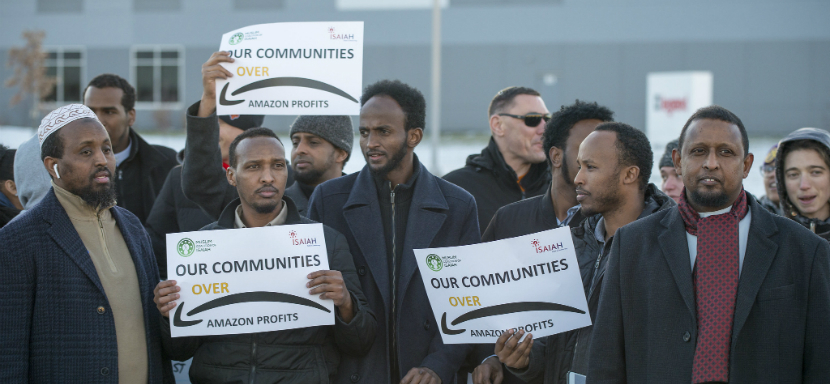Amazon is today’s most high-profile corporate villain. It’s the devil incarnate to activists concerned with labor standards, climate change, public subsidies, and the deportation machine.
But for all the condemnation of CEO Jeff Bezos, why have no U.S. Amazon workers managed to unionize?
Much like Uber, Amazon grew under labor's inattentive eye. By the time unions and worker centers saw the threat it posed, it was already a formidable opponent. It now threatens union bastions like supermarkets, UPS, and the Postal Service.
To take on Bezos’s empire, we’ll have to look beyond the go-to shortcuts. Amazon is so rich and powerful that it’s almost invulnerable to a corporate campaign or political pressure. This is a company that walked away from billions in subsidies for its potential headquarters in New York, in part to avoid union neutrality at a single warehouse on Staten Island.
Amazon can absorb higher wages—it already raised its minimum to $15—but that is not antithetical to its business model the way a union would be.
And we can’t take it on piecemeal. Amazon has a highly distributed network of facilities that can bear the blows of an individual workplace dispute. If workers at one facility won a union authorization election, Amazon would shut down that facility and shift the work elsewhere. Unions have recognized this—there’s never been an election among workers directly employed by the company.
IT’S NOT IMPOSSIBLE
Out of necessity, Amazon workers are starting from the building blocks of organizing: shop floor action to improve conditions. And they’re winning.
Through petitions and marches on the boss, warehouse workers in Chicago and Sacramento won drinking water and reversed unjust terminations.
Workers at an Amazon delivery center in Eagan, Minnesota, walked off the job in August over a parking mess— they routinely had to choose between arriving late and getting towed (which came with a fine of $350).
After just two hours on strike, the workers won. They got the company to pay their past towing fees and allow them to clock in from the parking lot! I’ve told that story to union activists with long-established contracts and they get wide-eyed: “I wish we could do that here.”
Meanwhile the high-tech workers who program and code are taking collective action, too. A thousand workers at Amazon’s headquarters in Seattle walked out in September, the largest group of U.S. workers to join the climate strike.
Their demands are ambitious—that Amazon eliminate carbon emissions and cut ties with the oil and gas companies to whom it supplies servers and exploration assistance. On the eve of the strike, Amazon committed to become carbon neutral by 2040 and buy a fleet of electric vans.
SNOWBALL EFFECT
These stories show that workplace action at Amazon isn’t impossible.
The warehouse workers have proven that wins are possible—site-specific ones, anyway. The tech workers have been among the most successful in their industry at mobilizing co-workers to action, and they’re forcing the company to grapple with climate change.
Unionizing Amazon through a traditional Labor Board process isn’t on the immediate horizon. But remember: that’s not how labor made its biggest gains in membership and power.
Over the last 100 years, workers from manufacturing to the public sector won improvements at work through years of organizing before their unions were recognized.
Organizers built shop floor committees, elected representatives, fought speed-up, challenged unjust terminations, and won wage increases. And in doing so, they won the their co-workers' support to take on ever-larger issues.
Concerted, collective action is the way we build power. When Amazon workers somewhere stand up to the boss— especially when they win something concrete—it inspires Amazon workers somewhere else to do the same.








